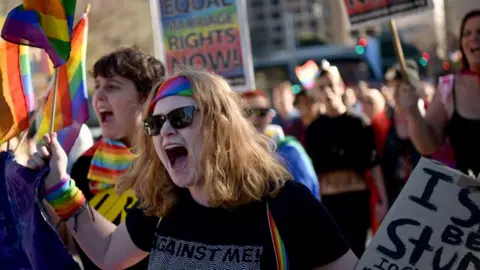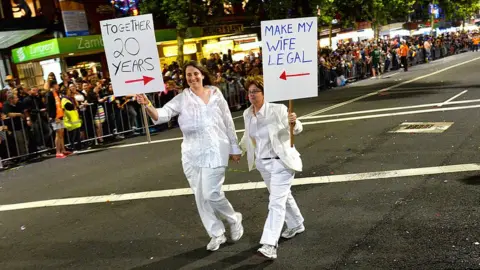Australia same-sex marriage vote: Why is there talk of a boycott?
 Getty Images
Getty ImagesAustralia is preparing for a voluntary and non-binding postal vote on legalising same-sex marriage. It will happen next month unless there is a successful court challenge.
The ballot itself would not change the law, but a "yes" result could clear a path towards amending Australia's Marriage Act.
But as advocates on each side begin campaigning, debate has intensified over the prospect of a boycott.
The case for staying away
This idea has been discussed by some same-sex marriage advocates who oppose the plebiscite because they want parliament to vote on the issue directly.
The most prominent of these is former High Court judge Michael Kirby, who has been in a same-sex relationship with his partner, Johan van Vloten, for 50 years.
Mr Kirby described the vote as a "Mickey Mouse" proposal in an interview with the Sydney Morning Herald. He told the ABC: "I am not going to take any part in it whatsoever."
"I feel as a citizen I'm being treated in a second-class way by interposing an arrangement of this kind between the making of the law in parliament, which is where it should be done," he said.
The retired judge labelled the vote "a novel, voluntary, non-binding, non-compulsory vote of a few citizens".
Other advocates have expressed fears that the campaign will expose LGBT Australians to vilification.
The left-wing Greens party has not ruled out supporting the boycott, but a spokesman told the BBC they would first consult with the community.
Australian Marriage Equality, a key lobby group, has not made its position clear.
The case against a boycott
Others though, including same-sex marriage supporters, have argued strongly against abstaining from the ballot.
On Thursday, Labor Senator Sam Dastyari used a stunt involving a rainbow-themed cake to urge young people to register to vote.
Government MP Warren Entsch, a long-standing supporter of changing the law, also urged Australians to have their say.
"By all means express your point of view, but don't boycott it," he told the BBC. "Focus on an outcome, and the quickest way to get an outcome is to get a yes vote."
 Getty Images
Getty ImagesIn an opinion piece in The Australian, writer Caroline Overington said it was time for the issue to be resolved.
"Same-sex marriage is a debate we've been having for way, way too long," she wrote.
Government minister Mathias Cormann said he was confident the debate would be conducted courteously. "We trust the Australian people," he said.
How the ballot differs from an election
Voting in the plebiscite will be voluntary - unlike in elections in Australia, which are compulsory - and happen through the post.
If the ballot shows support for same-sex marriage, it would still take a subsequent parliamentary bill for the law to change.
The Australian Bureau of Statistics (ABS) will conduct the plebiscite, unlike elections which are overseen by the Australian Electoral Commission.
This means the normal procedures and protections of election laws will not necessarily apply, according to Prof George Williams, a law expert at the University of New South Wales.
Australians need to register or update their details on the nation's electoral roll by 24 August, according to the ABS.
Citizens who have a registered address overseas will also receive ballots.
